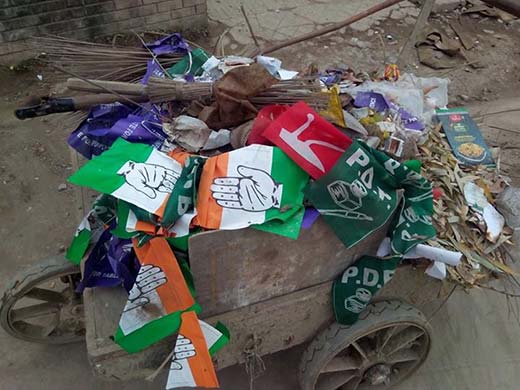by Meer Abass
On the onset of election fever, political parties belonging to ruling classes use all kinds of tricks to lure voters on their side to grab power. Money and muscle power is also utilized to overawe people.
Failed to understand, who is the original lion. Kashmiri treats every politician as a lion.

It is a battle of lions in the hectic assembly poll campaign in Jammu and Kashmir with every party claiming to be the ‘king’ of the political jungle in the Valley.
Getting elected should be very easy. If for five years you work for your voters without fear or favour then getting elected should not cost a dime. So why does election cost so much and take so much effort?
The answer lies in the party system and the political illiteracy that our state suffers from.
Our political illiteracy levels are near 95% or more. Even the educated among us are politically illiterate. They stopped getting any education after they pass the tenth class during which they had civics as a subject (of course this does not include people who did their BA and MA in Political Science).
Our political party system ensures that no representative of the people is able to do anything for the people that elect him/her. He has to follow the diktat of the party. And the party is driven by lobbies that want to get tailor-made laws and rules. Thus even if there is a lawmaker who wants to work for his voters, he can’t. Thus at the end of the tenure, if his party has something to show (which they usually don’t have), he can expect to get elected again otherwise he has to depend on the bluster of the party and its ability to convince the people that it has done them good. Or fake them with the bluster of a fake leader.
And if the representative has been doing good work then his constituents will not even want to see him or hear him during election time. They would have been in touch with him all through the five years and would know what he/she has done and delivered. Thus the cost of getting elected would be very negligible.
Now that is the kind of politics that we should all think of working towards.
And for a politician that is connected to the people, his/her formal education would not matter as much as his/her understanding of the pain points of his voters and his/her ability to solve their problems.
Therefore there are two things you can do, one is to get political education and second is to choose a representative that does work for you and not blindly toe the party line. Best would be to have a representative that represents you and not a political party.
“Walay vasie, asli sher hayy, aaaway (come, my friend, the original lion has come),” sing Kashmiri women folk in traditional rauf dance at political rallies.
“Nakli shera vatu daira, asli shera aa gaya (it’s time for fake lions to pack bags as the original lion has arrived at the scene,” is a common slogan witnessed in the campaigns right now in the Kashmir valley. While every party has its own share of slogans but it is the Sher, which is the common thread in their campaigns in the politically charged atmosphere in the Valley. Kashmir wildlife does not include lions.
The name of Sher-e-Kashmir has been prefixed with a prestigious medical institute in the Valley, an agriculture university, gallantry medals for police, employment scheme and Kashmir’s only cricket ground in the Valley.
PDP also invoked sher besides its slogans like “Sabzuk Alam chum aaths kyath, aasiy dee taar Parvardighar (The green flag is in my hand and God will help me crossing all hurdles)” besides the Sher slogan. The flag of PDP party is green.
National Conference has some more to offer their voters like “aap ki mushkil ka baaetbar hul, sirf hal hal hal (the only way for a honourable solution to your problems is plough). Plough is the symbol of National Conference.
There are multiple dimensions as to how Kashmiris interpret the elections. Some call it political maturity and see it as a befitting strategy to avoid having a party in power that has no sensibilities about Kashmir. Those who vote believe that if Kashmiris don’t vote, then the elected representatives will go down the same way as the previous ones have. Many see it as political leverage in negotiating for issues such as an immediate and urgent repeal of draconian laws in force in Kashmir and the release of youth who have been booked under these laws. Some consider it important for a long-term political solution to the conflict, which they think is only possible through consistent dialogue and negotiation with New Delhi, Islamabad and Kashmir.

BJP, besides its abki baar Modi sarkar slogans, has banners hanging at various traffic cross sections “aao badle Jammu Kashmir ke haalat, aao chale Modi ke saath (let’s change Jammu and Kashmir’s destiny, Let’s walk with Modi).”
It is said that in Kashmir nothing is straight except the popular tree, and it reflects the general persona of the biotic of Kashmir. Do we actually qualify to be humans? Well what is happening on the ground and has happened in the past, are contesting this prerogative. So the question arises, who is a common Kashmiri? And what are the aspirations, responsibilities and expectations out of a common Kashmiri?
(The author is an Assistant Professor (English) at the Government Degree College Handwara. Views expressed in this essay are personal and do not reflect the policy of the organisation.)















